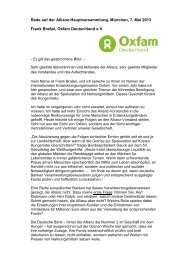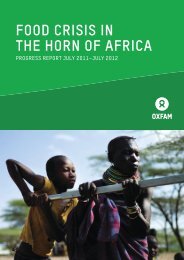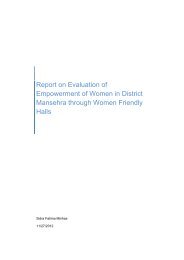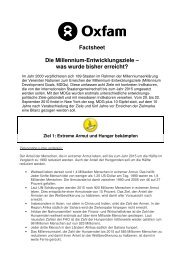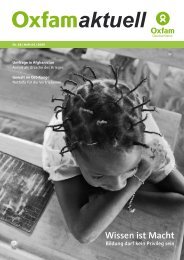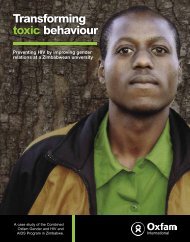No Time to Lose - Oxfam
No Time to Lose - Oxfam
No Time to Lose - Oxfam
Create successful ePaper yourself
Turn your PDF publications into a flip-book with our unique Google optimized e-Paper software.
these initiatives signify an important commitment <strong>to</strong> (and an appreciation<br />
of the strategic importance of) minimising civilian harm. <strong>No</strong>ne<br />
of these directives, guidelines or mechanisms apply <strong>to</strong> the ANSF.<br />
Recommendations<br />
As stated above, enhancing the accountability of the ANSF is both a<br />
political imperative and a legal obligation. All states have an obligation<br />
under international law <strong>to</strong> ensure respect for international humanitarian<br />
law, and some states have additional obligations flowing<br />
from domestic and/or regional law and policy regarding security<br />
forces they fund, train, equip, or operate alongside. All states also<br />
have a moral obligation and strategic imperative <strong>to</strong> acknowledge and<br />
dignify civilian harm incurred during the course of lawful operations.<br />
119 In fulfilling these obligations, and above all <strong>to</strong> ensure the protection<br />
of Afghan civilians, we recommend the following:<br />
To the Afghan Government and the International Community:<br />
1. Develop a procedure by which individuals put forward for inclusion<br />
in the ANSF are credibly and consistently vetted for<br />
gross violations of human rights. The procedure should be<br />
transparent, and Afghan civil society groups should be consulted<br />
regarding the his<strong>to</strong>ries and reputations of individual units. In the<br />
case of the ALP, the process of nomination by the shura is appropriate,<br />
however there must be appropriate inquiry in<strong>to</strong> the composition<br />
of the shura (including consideration of ethnicity and<br />
gender), and the calibre of nominations should be cross-checked<br />
with a range of sources such as community elders and religious<br />
leaders. US policies in particular should stipulate, publicly, that<br />
where members or units of the security forces put forward for inclusion<br />
in military training programs have been credibly accused<br />
of gross violations of human rights abuses but not investigated or<br />
prosecuted, those individuals or units will be disqualified from inclusion<br />
in such training.<br />
2. Improve the quality of training for the ANSF. The 2010 National<br />
Police Strategy contains a commitment <strong>to</strong> training the police on<br />
‘human rights, the legal rights of citizens and how <strong>to</strong> behave in an<br />
ethical manner’, and the MoI must be supported <strong>to</strong> make good on<br />
this commitment. Training for the ANP must include sufficient<br />
emphasis on community-based policing, good governance, the<br />
rule of law, the accountability of police <strong>to</strong> civilians and the differing<br />
security needs of women and men; and training for the Afghan<br />
Uniform Civilian Police must not be allowed <strong>to</strong> suffer as a<br />
result of a disproportionate focus on the counter-insurgency focused<br />
Afghan National Civil Order Police and Afghan Border Police.<br />
In the case of the ANA, a directive issued by the Ministry of<br />
26




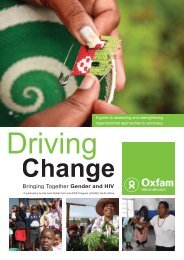

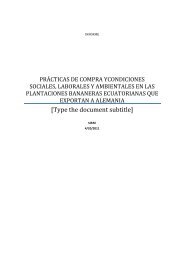
![Download: Faltposter EU-Handelspolitik [PDF 2,17MB] - Germanwatch](https://img.yumpu.com/25095854/1/190x161/download-faltposter-eu-handelspolitik-pdf-217mb-germanwatch.jpg?quality=85)
